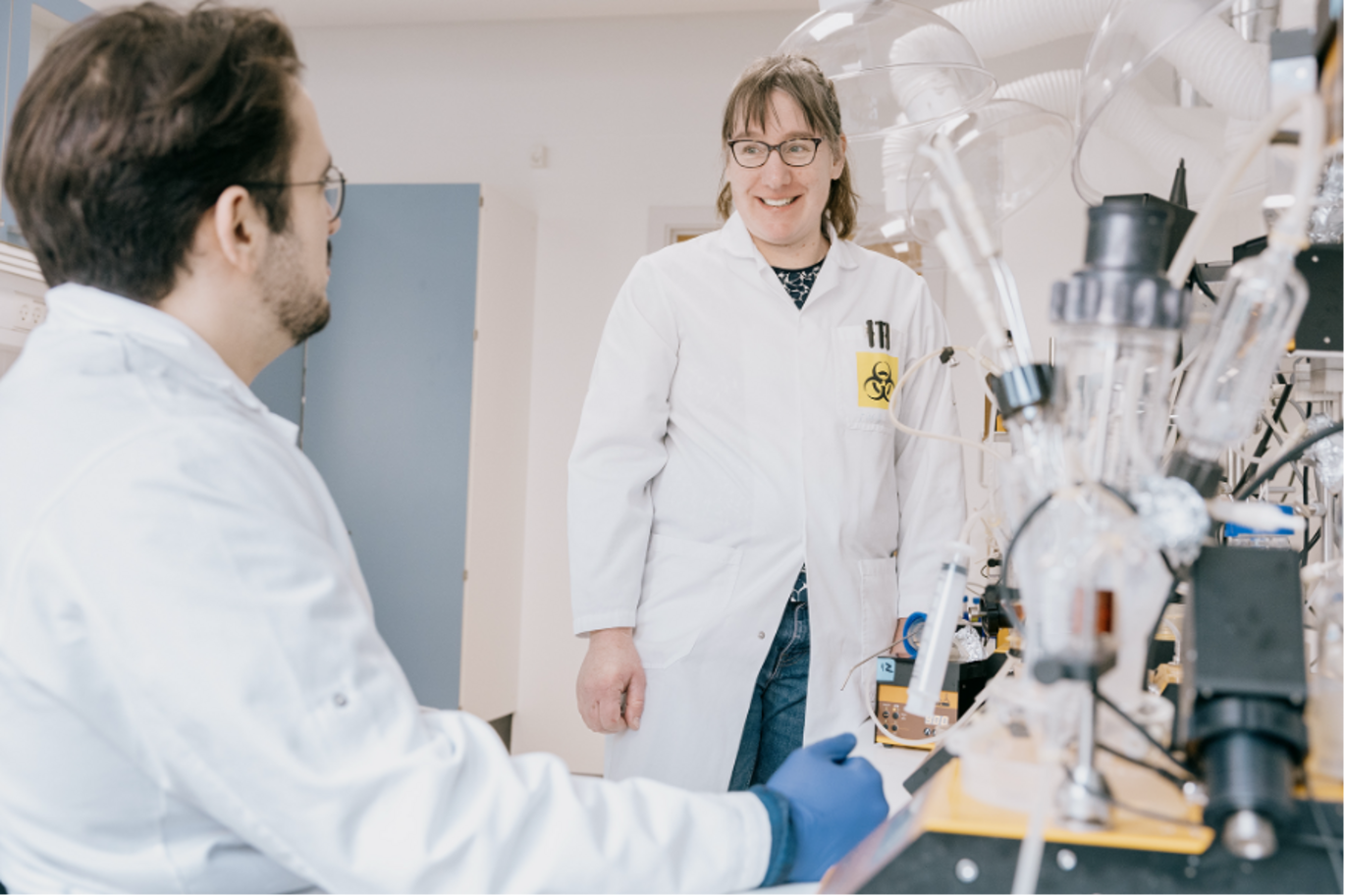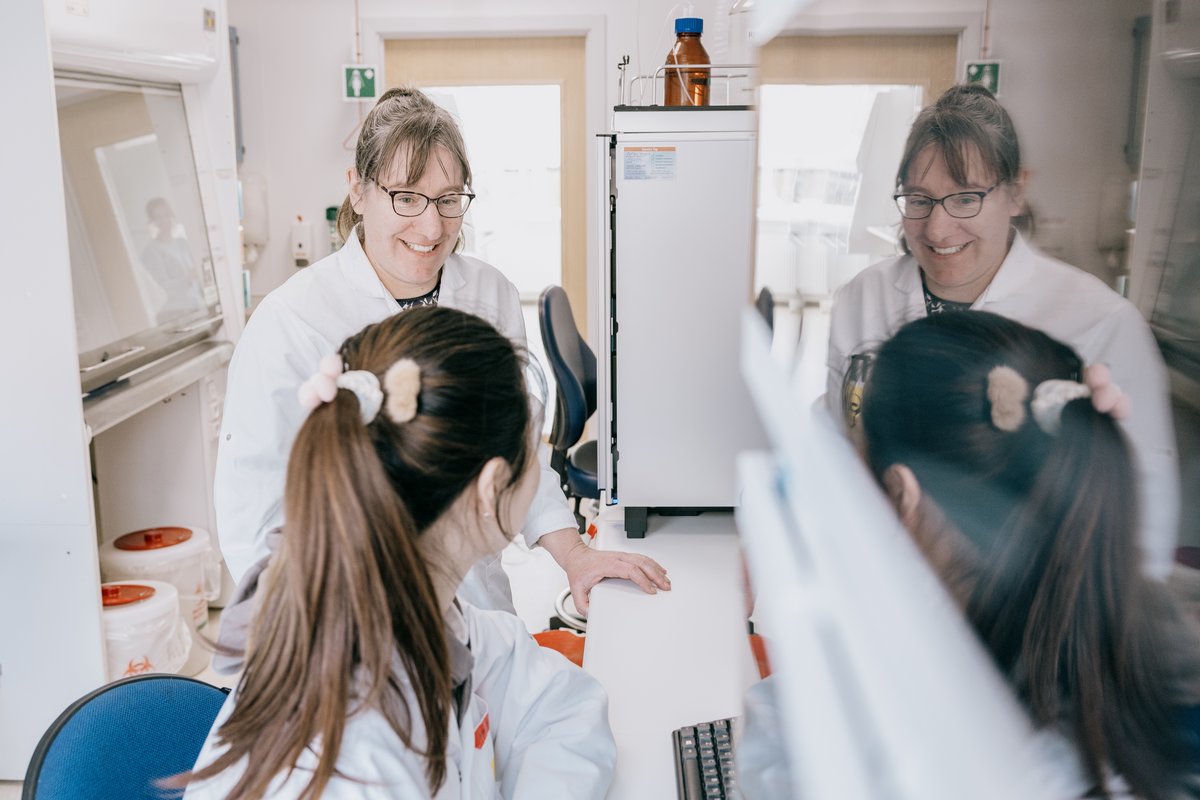New professor exploits bacteria to develop healthy food of the future
Clarissa Schwab has been appointed professor at Aarhus University. She will pioneer new knowledge on how we can use microorganisms to enrich our food and improve our gut health.

"Have you ever thought about what goes on in the food you eat or in your intestine?" asks Clarissa Schwab, a newly appointed professor at the Department of Biological and Chemical Engineering at Aarhus University.
She immediately answers her own question:
"Billions of microscopic organisms live in your food and in your gut. Each one has a specific function, and they can interact with each other in an incomprehensible number of ways. Gaining a better understand of what’s taking place means we’ll be able to create a biotechnological imitation of nature, and we can use this imitation to produce food that’s healthier, tastes better, has a longer shelf life, is less allergenic and so on.”
In recent years, the new professor has spent time studying the microorganisms in our digestive tract, and she hopes her work can pave the way for new knowledge that can be used to develop healthier foods and new forms of biotherapies:
“We know that the intestinal microbiome plays a crucial role in the function of our immune system, and we know that it produces important signalling substances that can influence our health. And this is why the biotechnological perspective for disease prevention and treatment is both very interesting and very topical,” she says.
READ ALSO: Researchers want to engineer intestinal microbiome to prevent childhood eczema

A staggering potential
Clarissa Schwab's research focuses on identifying microorganisms with specific functions, and she studies how bacteria interact with their environment to find answers to some of today’s biggest health and food challenges.
In the laboratory, she cultivates a host of different types of bacteria capable of producing new valuable compounds.
She believes that her research has only scratched the surface and there is much more to come:
"But things are moving fast," she says.
New tools for gene sequencing and data-driven analyses now make it possible to screen thousands of microorganisms in just one week. Ten years ago this work took several months.
“The number of potential microorganisms with properties we can exploit has grown enormously, simply because we now have the ability to find them. It’s an area of research with staggering potential, and we’re only just beginning to understand what we can do with it," says Clarissa Schwab.
Great interest from the business community
Most of Clarissa Schwab's research takes place in closed anaerobic environments, where she can work with a broad spectrum of bacteria while also preparing biological technologies for the world outside the lab.
As an engineer, she has a keen awareness of industrial reality, and she emphasises the importance of building bridges between research and business:
“The scientific discoveries we make in university laboratories must be robust enough to be scaled up and used in a production context. That’s always been a focal point of my research," she says.
And perhaps this explains Clarissa Schwab's success. She joined Aarhus University just four years ago, in the midst of the coronavirus pandemic. The department was new. The offices were deserted, and she was handed the keys to some empty rooms where she could begin setting up her laboratory.
Today, she is in charge of 150 square metres of experimental space. This is where her research colleagues and students spend their time finding answers to new questions. Companies frequently reach out to her, and the number of research grants she has received has increased significantly.
"There’s a great deal of interest in my research from the business community and I value collaboration with companies very highly," says Clarissa Schwab.
Is it possible to make bacteria produce protein or dietary fibre? Can we increase the shelf life of food without using chemical additives? And how do we identify intestinal microorganisms that can prevent allergies? These are just some of the innovation challenges Clarissa Schwab has been working on in recent years.
Technology will change our future food
If you ask Clarissa Schwab how modern microbe biotechnology will change food production in the future, her answer is:
"There are exciting new opportunities within fermentation, where we can use microorganisms to produce specific proteins, vitamins and fats. We’re also expanding our scientific understanding of how we can design food to optimally interact with the human intestinal microbiome. This kind of personalised nutrition is something I think we'll see a lot more of in the coming years. And we’ve already come a long way in developing new preservation methods with less industrial processing that leads to increased shelf life without compromising quality and health," she says.
And then there is the climate perspective on food, which she is personally very passionate about:
"We need to think about this in everything we do. I feel that I carry a special responsibility as a researcher. We’re currently living in a society in which our food production is the cause of major climate challenges. We urgently need to mature new technologies that can make us less dependent on traditional agriculture or resource-intensive industrial processing methods," she says.
Food of the future - five technology trends
Professor Clarissa Schwab points to five biotechnology trends that could have an impact on the food of the future.
1: No animals involved
In advanced fermentation the researchers are exploting microorganisms to produce specific proteins, vitamins and fats. This will make it possible to produce foods like eggs, milk and meat without animals.
2: Food as medicine
Personalised food is an interesting food technology trend where researchers are trying to design food that interact optimally with a person's unique intestinal microbiome. This will make it possible for people to improve their digestion and utilisation of nutrients, strengthen their immune system and reduce the risk of developing chronic diseases.
3: Clean label
Biotechnology is paving the way for the development of new microbiel preservation methods, which could reduce the need for additives and industrial processing of our food.
4: Functional foods
In recent years, science has opened up a whole new chapter in food history, where we can precision-engineer food with specific health-promoting properties and thus contribute to preventing diseases, strengthening the immune system or optimising digestion.
5: Next level climate awareness
New bio-based production methods can make us less dependent on conventional agriculture in the future and reduce the CO2 emissions associated with food production today.
Contact information and publication list
Clarissa Schwab, professor, the Departmen of Biological and Chemical Engineering, Aarhus University
